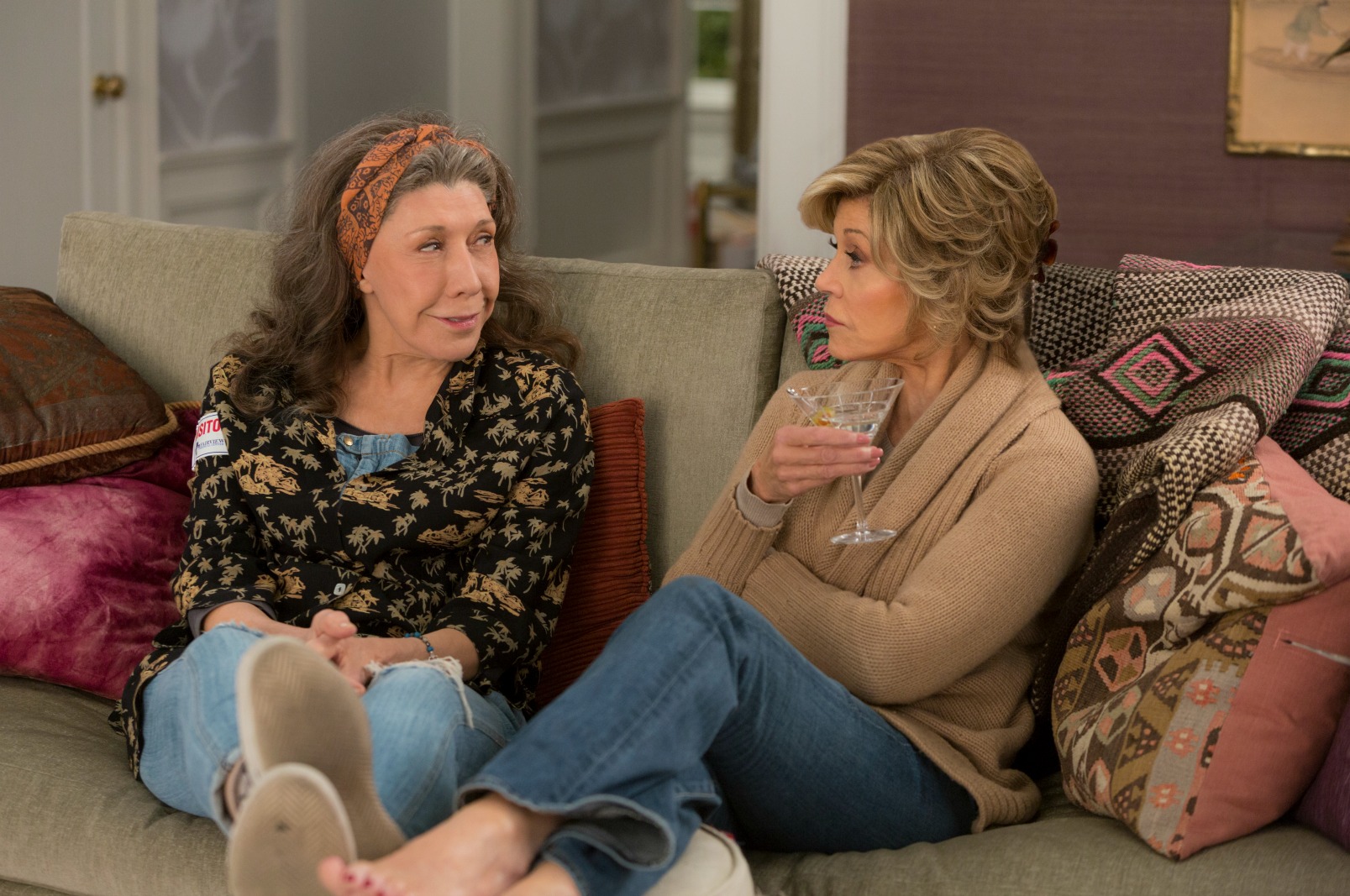Sometimes, after a long day of being a twenty-year-old, the last thing I want to do is watch a show about the wild parties I’m not going to and the hot love interest I don’t have. Lately, instead of going for “Riverdale” or “Grey’s Anatomy,” I eat my therapeutic chocolate while watching older ladies deal with menopause, divorce and aging. Netflix’s “Grace and Frankie,” my newest favorite Netflix binge, focuses on its title characters as they reinvent themselves after their husbands leave forty-year marriages for each other.
I could recommend the show for any number of reasons—the writing is smart, the family dynamics are funny and Grace and Frankie’s beach house is impossibly beautiful. What makes the show, however, is the spotlight it shines on older actresses and the strong stories their older characters endure. Frankie Bergstein is played by Lily Tomlin, seventy-eight, and Grace Hanson is played by Jane Fonda, seventy-nine. Both actresses have had long, successful careers, but “Grace and Frankie” still represents some of their best work as they portray complicated women who grow in the face of heartbreak. Don’t take my word for it either—both were nominated for Outstanding Lead Actress in a Comedy Series at last week’s Emmy’s.
While “Grace and Frankie” isn’t the first show to put older women and the problems they face center stage, it still stands out as a stark anomaly in a sea of content dedicated to people under the age of forty. Movies do a little bit better: recent releases like “45 Years,” “Grandma,” and “Elle” all feature actresses over sixty in compelling lead roles. To make these roles the norm, however, viewers have to demand interest in the stories. If you’re still not convinced that, as a college student, adding shows and movies about older people to your queue is necessary, here are four reasons to reconsider.
1. They help fight Hollywood’s gendered age problem.
“Hollywood is a harsh place for women who dare to age,” wrote Washington Post writer Jeff Guo in September 2016. He was referring to a new data analysis on acting and age completed by economists Robert Fleck and Andrew Hanssen. Fleck and Hanssen found that female actresses usually hit their “peak career time” as early as their twenties. Additionally, among actors and actresses over forty, men get over 80 percent of the leading roles. The lack of starring parts for older women means not only that actresses are out of work sooner than men, but that stories about older women aren’t being told at all. Supporting media that features older women as lead members of the cast helps to combat these norms and change these abysmal statistics for female actresses everywhere.
2. They bring new issues and stories to the forefront.
If I thought mum was the word on getting your period growing up, menopause seems to be an even more mysterious, hush-hush subject that no one fully understands. And yet, menopause and the sex life that exists after it are featured prominently on “Grace and Frankie” as natural, if sometimes frustrating, parts of life. Beyond confronting taboo topics, plot lines for older characters also offer an opportunity for greater emotional depth. Grace and Frankie deal with the death of close friends, workplace ageism and feeling infantilized by well-meaning but misguided family members. The film “Philomena,” which stars eighty-two-year-old Judi Dench, focuses on lifelong regret over a forced adoption and, in the process, brings a new lens to family and religious issues not possible if told by a younger character. Seeing these storylines play out in fiction made me look at the real older people in my life with more empathy and curiosity about the issues they face day-to-day.
3. They promote healthy beauty standards for aging women.
In a culture obsessed with youth, media that focuses on the beauty of older stars is rare and precious. At seventy-eight and seventy-nine, Tomlin and Fonda don all kinds of outfits, from stylish pantsuits to clogs and shawls, and look badass doing it. Neither seems to have gone crazy with Botox or plastic surgery, allowing their true aging beauty to shine through. Beyond looks, when older actresses are given substantial, complex parts to play, we begin to view age itself differently. Instead of a negative to prevent, it becomes a badge of honor, something to respect and look forward to. My favorite professor always tells me that things have only gotten better since she’s aged, and I wholeheartedly believe her.
4. They promote age and gender diversity in all areas of production.
I recently discovered Jane Fonda’s personal blog, a fun trip in and of itself, but one post in particular caught my attention. A picture, whose focus was Fonda and her dog, also featured an older woman working as a boom operator on the set of the show. In the caption, Fonda said, “Women never handled sound booms back in the day, so it’s a special treat to have Laura [the boom operator] and other women in jobs formerly done by men.” She goes on to say that about half of the show’s directors are women. In this way, featuring more stories led by older actresses becomes an endless positive feedback loop. If older women are writing, producing and directing more stories, they will be more likely to hire their peers in all areas of production. Though I’m only twenty, I can’t imagine only having twenty good years of work before job opportunities start to taper off. Supporting shows like “Grace and Frankie” helps fight against workplace ageism, and hopefully puts some good karma out in the world for your own budding career!
Watching shows about anyone leading a life different from our own cultivates understanding, curiosity and respect. While old age may not seem like the first place you’d choose to escape to, you might be surprised at how funny, emotional and interesting a journey with older characters can be. So on your next Netflix binge, humor me and sit back with your new favorite “old lady” TV show or movie. Your mind and your future self will thank you.

















